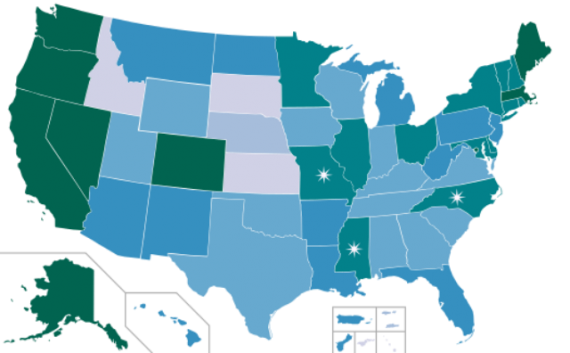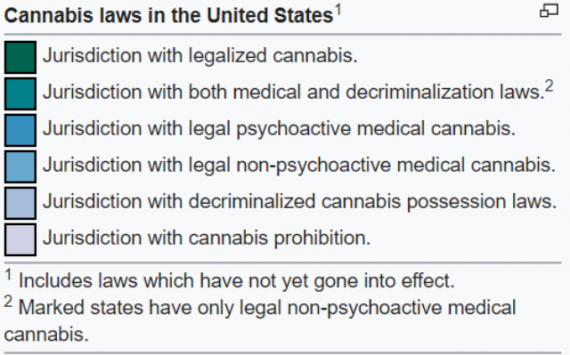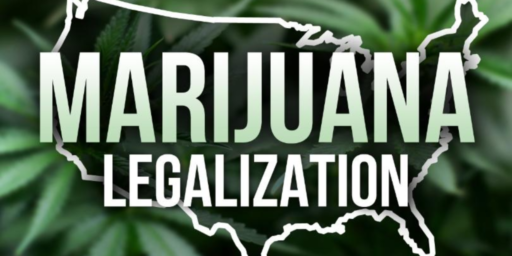Support For Marijuana Legalization Now Stands At 64% Of Americans, Majority Of Republicans
A new poll shows that a record majority of Americans, including a majority of Republicans, support legalization of marijuana.
A new Gallup poll shows that public support for marijuana legalization continues to increase among Americans:
A record high number of respondents to a Gallup poll released Wednesday said they support the legalization of marijuana, including more than half of Republicans polled.
Overall, 64 percent of those reached by Gallup said they support the legalization of marijuana, up 4 percentage points from October 2016. The percentage of Gallup respondents who support legalization has climbed consistently since 2012, when 48 percent of those polled said they supported it.
Marijuana remains illegal under federal law, but the drug has been legalized by eight states and the District of Columbia. Many other states allow marijuana use for medicinal purposes under laws with varying degrees of strictness.
This isn’t entirely surprising, of course. Polling over the past several years has shown an increase in the number of Americans supporting full legalization of marijuana, with even broader majorities supporting things such as legalization for purely medicinal purposes and decriminalization and other reforms to the laws regulating possession of cannabis to the point where most recreational possession is treated more like a traffic ticket than a criminal offense. A 2011 poll, for example, found that that 50% of those surveyed supported legalization, while even larger numbers supported legalization for medial purposes or decriminalization. By 2013, the number of Americans supporting legalization crossed the 50% barrier and that support for medical marijuana and decriminalization were even higher. That number reached 55% in 2014, and 58% by 2015, again with support for medical marijuana and decriminalization rising even higher. The trend, though, was clear. By increasing numbers, Americans were becoming comfortable with the idea of legalizing marijuana and the support for changing the laws regulating it at the state level only looked to be increasing in the future. With this poll showing nationwide support for legalization above sixty percent (60%) for the first time, the trend is even more clear and we appear to be on the course to a point where opposition to legalization is a distinct minority across the nation.
During that same period of time we’ve seen a growing number of states changing their laws to reflect the changes in public opinion and to reflect the reality that increasing evidence has shown that marijuana is not nearly as harmful as other illegal drugs such as cocaine or heroin, that contrary to popular myth it is not physically addictive, and that it is in many respect less harmful than legal substances such as alcohol and nicotine. The trend toward legalization began to gain steam in 2010 when Colorado and Washington both passed citizen referenda legalizing cannabis. Four years later similar measures passed in Oregon, Alaska, and the District of Columbia passed similar referenda. Most recently marijuana was legalized in 2016 in California, Massachusetts, Nevada, and Maine via citizen referenda and voters in a number of other states approved legalization for medicinal purposes. As this map from Wikipedia shows, the laws regarding marijuana have been liberalized to at least some extent in virtually every state in the country:
Here’s the key to the map:
As Christopher Ingraham notes in The Washington Post, perhaps the most significant result from the new poll is the fact that, for a first time, a majority of Republicans also support legalization:
For the first time in nearly 50 years of Gallup polling on the question, a majority of American Republicans say they support marijuana legalization.
Fifty-one percent of Republicans surveyed by Gallup this month said they support legalization, up sharply from 42 percent a year ago. Even larger majorities of independents (67 percent) and Democrats (72 percent) are in favor of legal marijuana.
Overall, 64 percent of Americans now support legalization, the highest percentage ever in Gallup polling.
(…)
The sharp shift in Republican voters’ views on pot is the most significant finding in the Gallup poll, coming during a time of increased federal skepticism of marijuana legalization efforts. Attorney General Jeff Sessions has asked lawmakers to undo federal protections for medical marijuana, repeatedly calling it a “dangerous drug.”
But greater support for legalization could complicate any administration efforts to crack down on pot. “Attorney General Jeff Sessions could find himself out of step with his own party if the current trends continue,” Gallup wrote.
As Gallup notes in its analysis of the data, there are many similarities between the trend that we’ve seen in this polling and the polling on the issue of same-sex marriage that showed support for marriage equality increasing at a more rapid pace over a very short period of time. In both cases, the change appears to be rooted in cultural and societal changes that have recognized that previous attitudes were based on incomplete information or biases that simply weren’t true. While it’s true that this increase in support for legalization has not led to the same rapid changes in the law we saw when it came to marriage equality, much of that can be attributed to the differences in how those laws can be changed. In the case of marriage equality, many of the changes in the law came through court rulings that found the laws against same-sex marriage to be unconstitutional and it was ultimately a decision from the U.S. Supreme Court that led to the legalization of same-sex marriage nationwide. In the case of marijuana, changes in the law can only really come through either the legislative process or, as has been the case in many states, through a referendum taken to the voters. The process for either of these events to happen moves much slower than the court system does, and can only often be blocked by a determined minority of voters. Despite this slower pace, though, the trend toward more liberal marijuana laws and eventually nationwide legalization, seems to be fairly clear. At this point it’s not a matter of if, but when.








And it’s only taken Americans what, fifty years to figure out the bleedingly obvious?
Now we know how long it will take Trump voters to figure out that they’re fools.
I don’t suppose people are actually growing dumber, but social media has done something terrible: it’s allowed every cretin to demonstrate his limitations in public. It’s very depressing. Right or Left the number of people who can actually explain, contextualize and defend their beliefs is in single digits.
Again, fair enough, I don’t expect everyone to focus as much on such things as some of us do, but if you’re not going to take the time to understand what’s coming out of your own mouth, follow the biblical advice: Even a fool, when he holdeth his peace, is counted wise: and he that shutteth his lips is esteemed a man of understanding. Or the updated version: Better to remain silent and be thought a fool than to speak and to remove all doubt.
Well it won’t be for at least 4 more years…because Trump/Sessions are clamping down, not relaxing.
To me this seems like an easy problem. We have two states that have had legalized MJ for almost seven years. Let’s analyze the impact on the quality of life in those places. Let’s get some facts first, then form conclusions.
I did smoke 1960’s pot in the 1960’s. I enjoyed it. Then after about a thirty year hiatus I did some contemporary stuff….knocked me on my behind. There is a low probability of further use by me. We do give some CBD to one of our pets about once a week.
@Slugger:
The ass-knocking effect wears off pretty quickly. I hadn’t gotten high for ten years or so when my wife and I went to Amsterdam. We giggled like morons for about an hour, removing ourselves from a restaurant because we just couldn’t stop and while the Dutch are lovely, tolerant people, dining to the sound of a pair of middle-aged stoners laughing is a bit much.
I get very good legal weed now and honestly I barely notice it beyond a mild euphoric effect. I wouldn’t try to drive a car, but I’m fine in the kitchen with open flames and knives. Much safer than after an equivalent amount of scotch.
I am 61 and have been consuming cannabis off and on for over 43 years. I am a husband, father, electrical engineer, successful business owner, musician, community volunteer and marathon runner. I never use alcoholic beverages or tobacco products. My health is excellent, and my memory is intact. I vaporize cannabis, no smoke, no smell, no problems. I finished my third marathon at Big Sur Marathon in April 1st place in my division (TYVM) with a finish time of 3 hours, 25 minutes and 8 seconds. I’m just one of Millions of health conscious Americans seeking the healthiest pathways forward in all aspects of my life. How long before the government quits lying to us and admits that cannabis is far safer than alcoholic beverages or tobacco?
Legalize, regulate and tax!
It makes no sense that anyone would be against a fairly harmless drug like pot and defend big Pharma and all the damage they have done to many of our citizens. That and alcohol are the real killers. I used to like pot when I was young but now it makes me paranoid, but if it makes anyone happy I say go ahead just be safe. I would so rather my relatives smoke a joint than get all liquored up and start fights. The holidays are coming.
@michael reynolds:
Look at it from another perspective; why do you suppose that Republicans are starting to be in favor of weed if not so that they can escape what they’ve done to themselves in the purple haze?
They’re starting to self-medicate for their depression. Sad.
Well, we were headed the right way 40 years ago. And then Nixon decided we needed a War on Drugs so that all the squares would support him against the hippies. And Reagan in particular but all his successors decided we couldn’t give in. Because let’s face it, no one ever hurt himself in the polls by being tough on “crime”.
At least half the problems we have in America are the result of making a bad decisions and doubling down instead of admitting it was a bad decision. And in that list of bad decisions we refuse to back down from, the War on Drugs takes win, place and show.
@Hal_10000:
I wonder how many million man-years were spent in prisons for something which will now be legal?
@michael reynolds:
Millions of man-years, trillions of dollars. There is no cost in this world greater than opportunity cost.
@Hal_10000:
Because whites outnumber blacks.
@michael reynolds:
And I suspect that’s in absolute numbers, rather than in percentages. For instance, I believe that our genetics is encoded in DNA, but the best I could do is a hand waving explanation at first year biology level, and if someone challenged me on it (name the experiments and their results etc) I’d end up being pretty embarrassed in no time at all – basically I believe it because I’ve been told its true, not exactly a ringing endorsement of my understanding.
And when people start asking about string theory I quickly change the topic – and that’s physics, something I’m supposed to know something about.
There was a Nobel Prize winning physicist, Victor Weisskopf (fitting name in his case), who lamented that by I think the 1950’s he could no longer understand well enough to explain everything going on in physics – and its gotten much worse than that since.
The lesson I guess is in your last statement – remaining silent about things we don’t really understand. Unfortunately for most of us that means 95% of what we talk about … kind of boring.
@Kylopod:
That’s certainly part of it, but its true even in places where race isn’t much of an issue – Japan for instance. I suspect a big part of it is economic – if you’re a have, then you probably are more worried about have nots than anything else.
Personally I think the biggest thing behind the drug laws is the profits of the prison industry.
@george: ALEC can be thanked for turning our prison systems into a profiteer’s dream. Privatization American-style seems designed solely to make the rich richer and screw everyone else. Of course, “conservatives” love it.We were on track track to rid the prison system of this parasite, but then came …you know…
As long as taxpayers are needed to pad the stock of CCA and its ilk, the GOP will probably keep pushing reefer madness.
@george:
I wrote carelessly, I should have specified that I meant people’s political, religious, philosophical beliefs. I don’t think people need to be ready to explain gravity or even explain how their cable box works. But when one takes a position, one should be able to explain, contextualize and defend it.
The utter lack of rigor on all sides is depressing.
I believe X, Y and Z. And can you explain why you believe X, Y and Z? Duuuuuh, because they confirm my assumptions? Because I heard them from a guy who sounded nice? Because X, Y and Z are trending on Twitter?
And I don’t just mean the stupid or uneducated. People with actual degrees from actual universities very often have no ability to explain what they believe or why, and yet insist on those beliefs. I don’t know how one does that. I cannot imagine asserting X, Y and Z unless I could defend them.
Now to find candidates for next year’s election who also support legalization beyond the usual if by whiskey spiel.
@michael reynolds:
Just out of curiosity, why the distinction between being able to explain, contextualize and defend (and I like the way you put that) politics, religion and philosophy but not scientific or technological beliefs? It seems to me that the underlying idea is the same in all cases – don’t claim to have or hold onto opinions you can’t justify.
If I don’t have good reasoning for thinking DNA governs our genetics (and sadly enough I don’t – maybe I’ll take some time this weekend to shore it up), wouldn’t it be better if I express strong opinions about it? Same for my cable box – admitting I don’t know how it works (though I suspect is much simpler than the mechanisms in express DNA so maybe I should tackle that one first) should be an automatic reflex.
Especially in the case of medicine, where many people confidently express what I’m pretty sure are usually very poorly justified opinions, and in many cases forcing them on their children – yes I”m thinking of anti-vaxers here – not holding onto opinions they can’t justify could be extremely useful.
In fact, I can’t think of any case where its good to have a strong opinion that you can’t justify. I’d say you’re unnecessarily limiting the case you made.